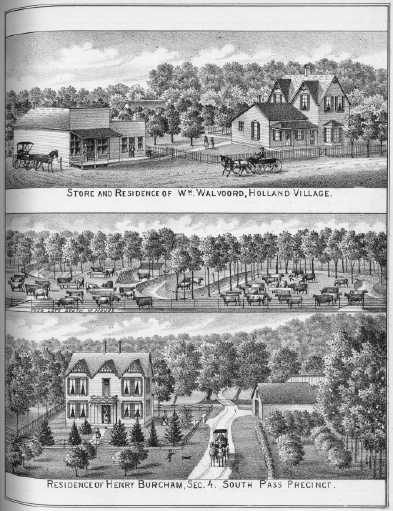tion and general public spirit. He
is now engaged in the peaceful pursuits of farming,
having his home on section 4, South Pass Precinct. His
great-grandfather Burcham came from England in
Colonial times, and his ancestry on the maternal side
is English also. Grandfather Burcham served in the War
of 1812, being loyal to the new country in which he
expected to make his home. The father of our subject,
McCarty Burcham, was born in North Carolina, and the
mother, Elizabeth (Owens) Burcham, in Tennessee.
McCarty Burcham was a mechanic and
followed the cooper's trade. After his marriage in
Tennessee he and his wife went to Indiana when there
were but four or five log houses upon the spot where
now stands the handsome city of Indianapolis. They
settled near what is now known as Plainfield, and by
industry and energy became very well-to-do. The mother
died on the homestead in Indiana in 1870 at the age of
seventy; the father survived her death but four years,
having attained the ripe age of seventy-four years and
five months. They had ten children, seven boys and
three girls, Henry being the seventh child.
Henry Burcham, our subject, was born
on the 1st of August, 1844, in Hendricks County, Ind.,
where he grew up with the country, but like the first
generation in any new State his educational advantages
were quite limited. In those days the schools, such as
they were, were supported by subscription, the master
sometimes being a neighboring farmer whose education
was sufficient to enable him to instruct the children
of the community. Our subject matured early, and at
the age of fifteen he had the physique of a large,
strong man, blessed with good health, which the
outdoor labor of farm life promoted. He engaged with
Mr. Hornby for one year, and driving a team for his
employer he accompanied him to Wapello County, Iowa,
where he worked for one year and rather enjoyed his
youthful pioneer experience.
In the spring of 1861, when the war
broke out, young Burcham went back to his home in
Indiana, and enlisted with Company F, 13th Indiana
Infantry, for three years. Like his father, imbued
with the principles of the Whig party, he could not
restrain his patriotism, and willingly offered himself
as a sacrifice, if need be, for his country's defense,
and with his strong, youthful arm determined to assist
in protecting the stars and stripes. He was mustered
into service at Indianapolis, Ind., and after being
equipped for war he departed for West Virginia, where
he for the first time encountered the Southern army at
Rich Mountain. He fought bravely in his first
encounter, and at the close of the eugagement, on the
11th of July, he had the satisfaction of enjoying the
victory with Rosecrans. When McClellan was appointed
General-in-Cheif he went boldly to the front,
participating in the following battles in Virginia:
Suffolk, Deserted Farm, Blackwater, Manchester, Green
River, Petersburg and Cold Harbor, while he was also
present in South Carolina at the sieges of Ft.
Wagoner, Ft. Sumter and Ft. Gregg. At the last-named
place he was taken seriously ill and was taken to
Hilton Head Hospital, where he improved, but in order
to give him an opportunity to recover the strength
that had been spent he was sent home on a sixty-days
furlough, during which time he recovered, and then
joined his regiment at Cold Harbor.
For gallant deeds of bravery and for
having proved himself a faithful and able soldier, our
subject was in 1862 promoted to the rank of Corporal,
in which position he served until the close of the
war. Although never severly wounded in battle, yet
there were times when he barely escaped the closest
call. Once at Suffolk a spent ball struck him in the
breast, disabling him for a short while; at another
time a musket ball grazed the top of his head, cutting
his cap into pieces and stunning him so that he fell
as if dead. In his last engagement before Petersburg
his life was miraculously saved in this way: It was a
very hot day and most of the "boys" had divested
themselves of their knapsacks, but our subject thought
he would keep his on. A piece of shell flying about
struck him squarely on the back and was found imbedded
in his blanket, and thus he was saved from
instantaneous death, on the 16th of June, 1864. The
fact of his retaining his knapsack seemed but a small
matter, and yet it proved to be the means of saving
his life.
Being mustered out and honorably
discharged, Mr. Burcham returned home to enjoy peace
in the country free from war. But the noble young
heart
|


